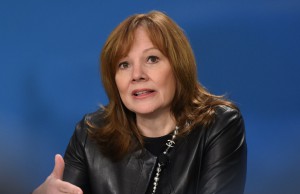
GM CEO Mary Barra said hourly employees weren't to blame for the $3 billion in costs related to faulty ignition switches so they'll get record-setting profit-sharing checks this year.
General Motors, FCA US and Ford Motor Co. will begin distributing profit-sharing checks soon, setting the stage for what is certain to become an intense debate over compensation for the companies unionized hourly workers.
Based on General Motors’ North America 2014 financial performance, the company will pay, on average, up to $9,000 to approximately 48,400 eligible GM U.S. hourly employees. The compensation was larger than allowed under the contract because GM elected to pay profits based on the company’s earnings before the $3 billion deduction to cover the cost of recalls. The recalls were the fault of GM’s management not GM’s workers, GM Chief Executive Officer Mary Barra said.
“UAW members at General Motors are proud of what they do and see profit-sharing as another validation of their hard work producing quality vehicles. Profit sharing does more than put a few dollars into a member’s pocket. It means more to spend in the community and each little bit makes a big difference for everyone,” said UAW vice president Cindy Estrada, who is in charge of the union’s GM Department.
FCA US, which declined to confirm the profit-sharing checks will be distributed this week, said payouts will increase by 10% to $2,750 from $2,500 in 2014.

The delay in the changeover to the new aluminum-bodied Ford F-150 pickup cut Ford profits, taking a bite out of profit-sharing payouts this year.
However, the profit-sharing checks at Ford will be smaller than they were last year since the company’s North American profits dropped last year as it prepared for the launch of the new F-150. Ford’s roughly 50,000 U.S. hourly workers will collect checks will averaging $6,900 March 12. The checks will be smaller than the $8,800, on average, hourly workers collected in 2014. Salaried workers also collect a comparable amount in profit-sharing.
(New vehicles getting less than 20 mpg on the decline. For more, Click Here.)
Ford’s payouts are based on a formula that rewards each hourly worker $1 for every $1 million earned in North America. The formula was developed as part of contract negotiations between Detroit’s automakers and the United Auto Workers in 2011 and simplified a more convoluted formula.
UAW president Dennis Williams told reporters last year the UAW intends to review the profit-sharing formulas at each company again 2015. He cited the dramatic rise in pay for top executives in the auto industry as a primary driver for the effort.
(Click Here for details about how truck sales are on the rise.)
Williams also said the UAW will also be looking for an increase in the base pay of workers at all three companies.
Sergio Marchionne, however, has insisted that the industry has to stay away from any kind of pay increase. Instead the industry must come to rely more than ever on what he described as “variable compensation,” a phrase that includes profit-sharing.
(To see more about why recall numbers are expected to remain high this year, Click Here.)
While Marchionne appears to have staked out FCA’s position, the other automakers are working up their own agendas. General Motors appears to lean towards preserving the status quo. Ford’s concerns revolve around keeping the average wage of workers closer to those paid in the Southern transplants where compensation has dropped since the 2008-2009 recession.

Maybe they should start paying taxes on the profits and saving the rest. It doesn’t look like they still need tax breaks which are really just welfare payments.
If it is indeed true that compensation has dropped at the Southern transplants, it is hard to believe that the workers down there are content. It’s well-known that Southern politicians, funded by out-of-state interference from people like Grover Norquist, are the main reasons these workers aren’t getting better compensation. Is the fear being engendered by these politicians such that workers are to afraid to advocate for themselves and join together to negotiate for a better way of life?